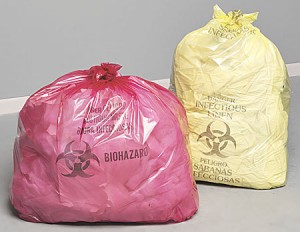Biomedical Waste Management
Did you know the Environmental Protection Agency (EPA) does not regulate biomedical  waste at the federal level? Biomedical waste is typically regulated by the state and/or local government. In Florida it is regulated by the Department of Health but is delegated to the counties within the state. What is biomedical waste? The answer is: it depends. Since biomedical waste is regulated by the states each state has a definition. In Florida, for example, biomedical waste is defined as “any solid or liquid waste which may present a threat of infection to humans, including nonliquid tissue, body parts, blood, blood products, and body fluids from humans and other primates; laboratory and veterinary wastes which contain human disease-causing agents; and discarded sharps….” One the other hand, in New Jersey (my home state) the waste is called regulated medical waste and includes “any solid waste, generated in the diagnosis, treatment (for example, provision of medical services), or immunization of human beings or animals, in research pertaining thereto, or in the production or testing of biologicals….” Both the Florida and New Jersey regulations have a list of materials that are also included following the definitions. Notice in Florida only human and other primate wastes are included while New Jersey includes humans and all animals—not only primates. This highlights the importance of reviewing the regulations, especially if your company has facilities in multiple locations.
waste at the federal level? Biomedical waste is typically regulated by the state and/or local government. In Florida it is regulated by the Department of Health but is delegated to the counties within the state. What is biomedical waste? The answer is: it depends. Since biomedical waste is regulated by the states each state has a definition. In Florida, for example, biomedical waste is defined as “any solid or liquid waste which may present a threat of infection to humans, including nonliquid tissue, body parts, blood, blood products, and body fluids from humans and other primates; laboratory and veterinary wastes which contain human disease-causing agents; and discarded sharps….” One the other hand, in New Jersey (my home state) the waste is called regulated medical waste and includes “any solid waste, generated in the diagnosis, treatment (for example, provision of medical services), or immunization of human beings or animals, in research pertaining thereto, or in the production or testing of biologicals….” Both the Florida and New Jersey regulations have a list of materials that are also included following the definitions. Notice in Florida only human and other primate wastes are included while New Jersey includes humans and all animals—not only primates. This highlights the importance of reviewing the regulations, especially if your company has facilities in multiple locations.
I recently created a procedure for the management of biomedical waste for a client. One of the items I included was training requirements—in this case training was required annually and the state regulations specified what the training must include. Also keep in mind that any employee who signs a biomedical waste shipping document typically confirms via the statement on the shipping paper that the waste is packaged and labeled according to the Department of Transportation Hazardous Materials Regulations (HMR). The HMR requires employees who affect the transportation of hazardous materials (including regulated medical waste division 6.2) to obtain training. Learn more about the HMR requirements in my post on the subject.
Facilities that generate biomedical or regulated medical wastes are also likely required to comply with the Occupational Safety & Health Administration’s (OSHA) Bloodborne Pathogens Standard. Unlike biomedical waste, this standard is regulated federally (perhaps by the state and local agencies as well) and requires employers to have an Exposure Control Plan, conduct training annually and provide employees with vaccinations for Hepatitis B. Employees do have the option to refuse the vaccination but must sign a waiver found in Appendix A of 29 CFR 1910.1030.
Biomedical waste is not much different from other materials which facilities discard—like hazardous waste, compressed gases, flammable liquids—in that three main components must be considered: employee exposure, onsite management and transportation requirements.
Need more info? Please find following some resources that provide additional information on the subject or feel free to leave a comment below:
State Medical Waste Programs & Regulations
Department of Transportation Division 6.2
